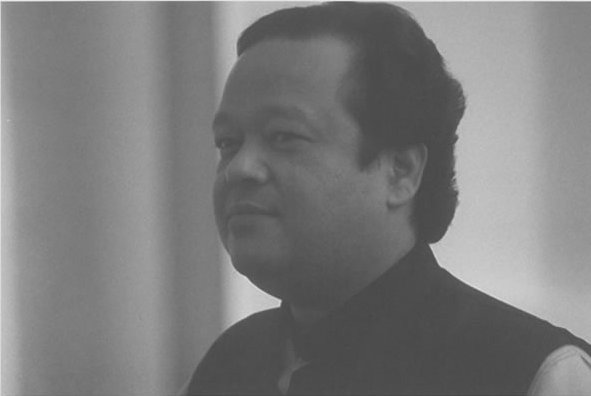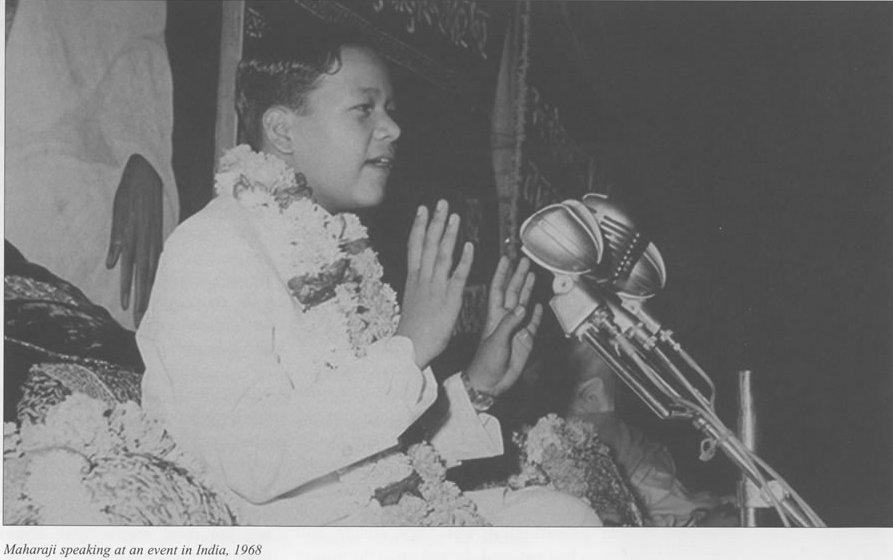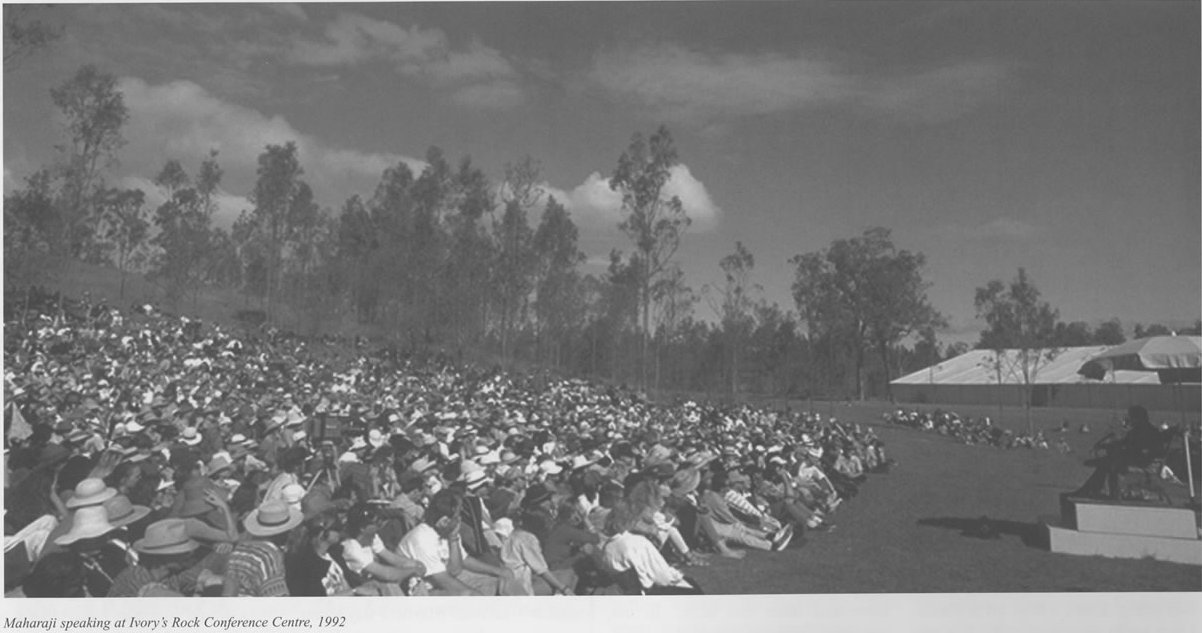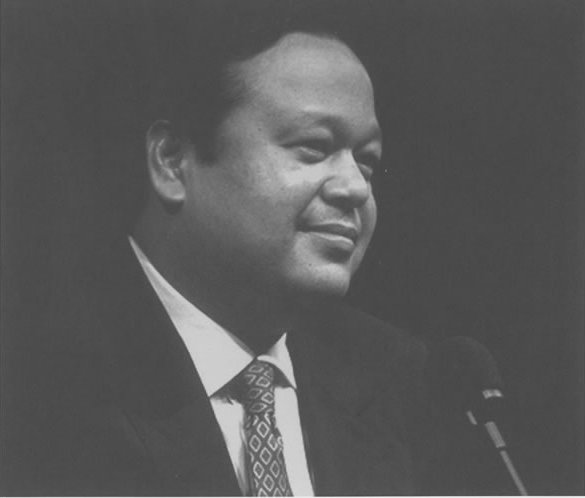THE DIVINE TIMES 11
Just before Maharaji left his Los Angeles home for the Anniversary Celebration in Miami, he sat down with a few people in a little meeting room connected to his office. For an hour he talked about what it was like for him to come to England and the United States 25 years ago, when he was only 13 years old. He also spoke about what happened 30 years ago, when his father and master passed away and he became a master.
 When did your attention go towards The West the first time?
When did your attention go towards The West the first time?
Maharaji: Right from my early childhood Shri Maharaj Ji, my father, used to say that I would spread Knowledge throughout the West. That's why it was very important for him that I go to a school where I could study English. So, it was not a new thing when it finally happened. As I was growing up, everybody always talked about it. "You're going to go to the West."
Do you remember him telling you that you would go to the West?
Maharaji: I don't remember specifically: it's more of a collective memory of what everyone was talking about. It was very important in those days that, somehow, Knowledge would get across to the West. But there was a barrier, because most of the people who could speak English had jobs and weren't instructors, so they weren't going to dedicate their life to it.
But slowly, pieces started coming together. Some people from England came to India and received Knowledge. After they went back home, they invited Charnanand to England. He went and I remember him sending me pictures. He would hang out at Hyde Park and talk to people - whoever came his way.
One day I came back from school, and there was a green van parked in the driveway. I went and looked at it, and there were a bunch of hippies sitting in the back. And that was very interesting. They had driven all the way from Europe to India to see me.
Then people began to ask me, "Will you come to the West? Please come to the West!" But it was still like a dream that would happen some day. The most concrete step that was taken was that I applied for a passport, and when I got it, I was very excited. Now, it could be a reality.
Then the invitation came, the ticket came, and everything just started to click - so much more than I could have imagined. I had travelled by airplane in India, but I certainly had no understanding of what it would mean to travel ten or eleven hours to go all the way to England. I had never been in the international side of the terminal. I had only flown domestic, but I would are the big international airplanes and think, "Someday. Someday, I'll go."
Then when it really started to come together, it was very simple and fascinating. I showed up at the airport wearing two sets of clothes because I didn't know if there would be a place to change. So, I left India wearing a Nehru jacket and pants on top and a kurta and pajama underneath. I had no idea what it was going to be like in England. We took off and went on to England. You can imagine a young boy just looking around. The windows in the car weren't big enough. Everything was going by too fast to grasp. I had no concept of jet lag. I felt a little strange, but I didn't know what it was.
Everything was so different from India. But after the first few days, the fascination wore off, and it started to hit me, "Oh, my God. If you don't like this, you can't just go back in 15 minutes. You're here." But as I started to do the events, my focus was more on spreading Knowledge than on being in the West or how different everything was.
It wasn't that long before I got comfortable being there and doing events. I woke up in the morning, and there would be people waiting to see me. I would talk to them and answer their questions. Sometimes there would be an event in the evening, and if there wasn't, I would meet with people again. And that was pretty much the schedule every single day. That was it. The interest has been growing ever since.
Do you sometimes wish you could have that simplicity again of just walking out of your door and there would be people asking questions?
Maharaji: I enjoyed that time very much - all the interaction and people's questions. Sometimes the questions were strange, but I still enjoyed them. Of course, there was always someone who was just trying to put one over on me, but most people were coming from a very sincere place.
SPECIAL EDITION 17 JULY 1996
 It was very intimate. There would only be 20, 30, or 40 people in the room. Today, with the quantity of people coming, it wouldn't work even if you had a very simple thing happening. It could never be that intimate.
It was very intimate. There would only be 20, 30, or 40 people in the room. Today, with the quantity of people coming, it wouldn't work even if you had a very simple thing happening. It could never be that intimate.
But I also enjoy what is happening now. I enjoyed it then, and I enjoy it now.
It was your summer holiday that you spent going to the West. What was your perspective on that?
Maharaji: In one sense, nothing was different because I would go on speaking tours in my summer holidays. That was a good time for it because my mother really didn't want me to miss school. So, when the holiday season would come, that's when all of the tours would happen.
Of course, sometimes it was so hot that you couldn't even imagine. I remember one place was so hot that we had to sleep outside. In India, you could get huge blocks of ice. I would put one under the bed and then scoop ice water off the top to wet down the sheets so I could sleep.
So, it was nothing new for me to spend my summer holiday going on tour. The only difference was that this summer, the tour would not be in India.
In England, a base had been established which had had a chance to grow and to stabilize a little bit. Then, once I came to America, things really picked up. The enthusiasm was fantastic and grew quite rapidly.
Support was available, the halls were inexpensive, and interest was high. Once I could see what was happening, it became obvious that there would be no point in going back to India at that time. I think that if I had gone back - and this is, of course, only speculation - propagation would have taken a very strange turn. Instead of me doing it, it would have been done in my name.
As it was, it was very beautiful. People would listen and when they were ready, Chamanand would say to me, "These are the people who want to receive Knowledge." And I would say, "Okay, do it," or, "these people aren't ready. Help them." Sometimes people would come directly to me and say, "How come I can't receive Knowledge when I was told I could?" And I would say, "Look. Just take it easy."
Charnanand had a very simple approach. At first, in India, Charnanand didn't know English, and he made a tremendous effort to learn. He started studying and speaking English on his own. He was very sensitive to people. There wasn't an ego trip going on. His approach, I think, has always been that he doesn't know more than you do. So, he didn't try to put anything over on anyone. He didn't try to convert people or to put thoughts in their minds, by saying, "This is the way it should be." For Charnanand, it was more a question of pleasing his master by doing what was expected of him than producing a result.
I think it was a very sweet time because of the simplicity that existed. But it didn't last very long because the groups got bigger and bigger and more instructors came from India. The instructors that came from India were much more result oriented. Their attitude was, "Let's do something for him. Let's get him a house, or let's get him a car."
There was a tremendous amount of pulling together for everything. But when things started happening that were result oriented it wasn't sweet anymore. This is important even today - just to enjoy the events. You can get so caught up in what is happening that you forget why you're even there.
The way I see it is, when you are thirsty and there's water, something magical happens. You don't have to lecture anyone. You don't have to show anyone a manual, or teach them the appropriate way to drink water. That's not necessary. If the water is there, and thirsty people are there, they will go and drink. What difference does it make how it is done?
That smoothness, or sweetness of things - that's what is very special. It was there at that time, and everybody made a little bit of effort. There was a lot of welcoming of me and of Knowledge into people's lives. When people receive Knowledge because they want to welcome it in their lives - to welcome that feeling, to welcome that master in their lives - then everything works really well. Sometimes people receive Knowledge for other reasons - to make their blood pressure go down, to make their head hurt less, or something else. But Knowledge doesn't work for that.
 "I had never been in the international side of the terminal. I had only flown
domestic, but I would see the big international airplanes and think, 'Someday. Someday, I'll go'
"I had never been in the international side of the terminal. I had only flown
domestic, but I would see the big international airplanes and think, 'Someday. Someday, I'll go'
Have you, in dealing with aspirants, gone back to the simplicity of when you first came?
Maharaji: Yes, absolutely. And not only with aspirants. Across the board. There are a lot of people who welcome Knowledge into their lives, and I think they are having a tremendous experience. Then again, some people are receiving Knowledge because they are goal oriented, and they may not even be practicing.
When you arrived in The West people must have seemed very different, even a little strange at times?
Maharaji: No I look at people for who they are. Obviously, you have situations. I remember this one lady at Alta Loma Terrace, in Los Angeles. She had really bad body odor. I think there's a medical term for it. She loved to sit as close as she could to me, and
THE DIVINE TIMES 13
it was unbearable, wholly unbearable. There was nothing I could do about it, and it would happen every day. You just learned to live with it.
There was a lot of mutual respect between me and the premies. And I hope it's the same today. That shouldn't change. There should be a lot of respect. I meet many people, and I guess everybody is special in their own way. But there is a different quality in premies and people who are interested in Knowledge because they're not just aspiring for some plaque on the wall. They're aspiring for that sweetness and magic in their lives. And that's really, really special.
When you decided not to go back to school at the end of the summer holidays in 1971, was that a major decision in your life?
Maharaji: Well, no. It wasn't that I decided not to go to school. What I decided was to continue doing what I was doing. That's a little bit different. I just really awakened to the fact that something was happening here. I was away from my family, and I loved it. At first, I thought it was going to be hard, but then I realized it was just wonderful. It was the best of all worlds. Here I was, doing what I really wanted to do, what I loved to do. And when I saw the response and the love and the feeling, I just knew this was what I wanted to do.
One day, I called home to my mother, she said, "How are you?" And I said, "Well, things are going well …" And then she asked, "What about your school? Aren't you going to come back?" And I said, "Well, look. I'm doing what I'm doing and this is what I want to be doing." Then there was silence. And that was it. So, from then on I didn't learn things formally in school. But I never stopped learning. I have gone on to learn and learn and learn. To me, learning is just wonderful.
You probably learned a lot more because you didn't go to school!
Maharaji: That is entirely possible. (Laughter). The real learning doesn't always happen at institutions. Even so, many times I think about finishing up high school and college through correspondence courses or whatever.
Do you feel that you have been destined to do what you're doing?
Maharaji: Only on bad days!
(Laughter)
Could you imagine yourself doing anything other than what you are doing?
Maharaji: Oh, I can imagine. But it wouldn't be real. Maybe I daydream sometimes, but not about doing something else. If you daydream, then that daydream has to have pleasure in it. But to me, doing anything else wouldn't have the pleasure of what I am doing now.
When you look back in your life, have you always had that pleasure?
Maharaji: Yes.
 Have you always felt comfortable speaking to large audiences?
Have you always felt comfortable speaking to large audiences?
Maharaji: I was very, very young when I started speaking to people. I've always felt comfortable with it. I was speaking to people even before Shri Maharaj Ji passed away, before I became a master.
I remember one time I did a debate at school, and I won an award for it. At that age, the hall where it took place looked huge. The debate was on the t p f "Does it really matter, what you wear on the outside?" And so, I wrote my debate down and polished it up, and then I went up in front of all these kids who were "Ooohing" and whistling. I still remember how nerve racking it was for me. I had spoken at events with ten times as many people and didn't skip a heartbeat, but being in that hall with all those kids was most difficult. But I did it. I won an award and I don't even know where my cup went.
How did it happen that you started to speak at your father's events? Did he just ask you to speak?
Maharaji: No, no. I don't even remember how it happened. Some of the memory is so vague. It comes back only when I see the pictures. I think I just sat up there and somebody put a microphone in front of me, or there was one, and I just started speaking. I couldn't even speak properly yet. I was so young, I couldn't articulate the words properly.
Would you like to speak about what happened when your father died and you took the responsibility of becoming a master?
Maharaji: I always felt very close to my father. I used to sleep between him and my mother. When he passed away, it was an extremely intense time for me. I remember crying for days. And then, there was a whole thing going on about who would be the master. Basically, I didn't know that was happening. I was too young for that. I was in the hall, and there was a room underneath the stage which had windows. I could see the audience and all these people were crying. So, I went up on the stage just to tell them they didn't need to cry. What they wanted, or what was important to them, would continue. I was talking to everybody, and then I was the master. I think Shri Maharaj Ji had foreseen that.
He had spoken to people about it?
Maharaji: No, he had sent a postcard to the family from where he stayed on a tour. I don't remember all the words, but the beginning was, "I bow down to the feet of Sant Ji Maharaj."
Does a master make himself? Or is he made by the master before?
Maharaji: No. A master has to do what a master has to do. And that's what makes him a master. The former master might bless a person to do that, but the master still has to be a master. To be a master, you have to camre and you have to give, and you have to understand. You have to do what is best for the student. And it takes a very special commitment to do that.
But it must also take ability.
Maharaji: I think when the heart is there, the ability can come.
Did you realize the implications of it when you went on stage and told people not to cry?
SPECIAL EDITION 17 JULY 1996

Maharaji: No. It was just a very simple gesture because I saw them in pain. My own reconciliation after my father passed away was, "that which I love never really dies, so I can continue to have that love forever." This was the same thing. I saw these people crying, and there was no reason for them to cry, because that which they really loved would go on Forever - even beyond them. Because it's much bigger than any one person. That's what I wanted to tell them. And there was an incredible acceptance by the premies. I think it was a question of obviousness that did it, rather than any official thing. When I came out and I was telling them what I was telling them, everybody just turned around and got lifted and the same feeling was still there.
It was the recognition by those people that did it, rather than anything else. Afterwards, there was a ceremony and a crowning, but that was all afterwards. The obviousness of it was what stole the moment - or gave the moment.
And I think it was the same with Shri Maharaj Ji and his master. A lot of people said "No, no. We are the ones." But there were so many other people who just recognized the obvious, and that was it.
You have said that a master doesn't have to teach. He could choose just to be by himself and enjoy?
Maharaji: Yes.
But what makes a master a master, is it a special ?
Maharaji: Well, we're talking about two different things here. We're automatically assuming that the love, the caring, the concern, the dedication, and the commitment is brought to life in teaching. The assumption is that a master has to go on stage, that a master has to teach, because this is the format in which these things usually manifest. If you remove that assumption, then it could be any which way. Then, both things hold true. He can choose to go on the stage, to talk to people, to have magazines, to have videos. Or he can choose not to do any of that. But the caring, the concern, love, and Knowledge will still be there.
 When you came to the West, you were 13 years old. Didn't a lot of people have a problem with that?
When you came to the West, you were 13 years old. Didn't a lot of people have a problem with that?
Maharaji: I think a lot of people had reservations about that. "Why am I going to listen to a 13-year-old kid? What is he going to tell me?" When people would come to me, that was definitely an issue. "What are you going to tell me? What are you going to give me?"
Amongst some people, there was always that kind of feeling. "Well, what are you going to tell me?" And "I can always knock you down. You can't argue with me." As I saw it, I didn't need to argue. I had no arguments to make. I wasn't trying to offer people a better lifestyle or a substitute for religion.
I think that when people heard the message, they said, "Okay." It boils down to the same thing we talked about before about the obvious. That's what does it for a lot of people, as soon as they heard me speak, the barrier just melted. It is like the water and the thirsty. No manuals are needed on how to drink it.
Some people had a concept that I was some kind of a messiah or prophet, and that wasn't really acceptable to a lot of people. But I was saying right from the beginning, "I'm not a messiah; I'm not a prophet; I'm not any of those things." Those are just concepts.
It's a bit like somebody who is really thirsty walking along in the middle of a dry river. And then he finds some delicious water in a little pond. But the person says, "Wait a minute. The water didn't come in a water bottle. So, I can't drink it". I think a lot of people get caught in a format. I very strongly believe in the simple miracle of the people who are thirsty and the water. They have a way of finding each other and the job gets done.
And that takes us to an even more fundamental issue. What is the proof that Knowledge is real? The proof is in itself. You feel, you experience, you enjoy. That is the proof.